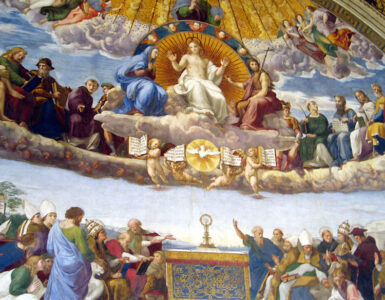Over two hundred fifty years ago there was a man named John who, though he had been raised a Christian by his devout mother, led a very sinful life. As a sea captain, he did evil things, including involvement in the slave trade; he didn’t care about the people affected by his actions, and was unrepentant of his sins. During one ocean voyage, however, one member of the crew had brought along the famous Catholic book The Imitation of Christ, written in the Middle Ages by Thomas a’ Kempis. Having a lot of time on his hands, John read the book—and it changed his life, for the seed of faith which his mother had planted years before finally began to stir.
Soon after this the ship encountered a very fierce storm—one so bad that even the veteran seamen were certain the ship was doomed. Face to face with death, John realized he was not ready to die—and he begged for God’s mercy and protection. Miraculously, the ship survived. John was touched by God’s grace, and knew he had to change his life completely. He resigned from the merchant marine and, at the age of 39, became a minister in the Church of England. He was assigned to a parish where he was deeply loved; the people appreciated him because he was kind and considerate, because he was a good preacher who spoke in a down-to-earth way, and because he did one other thing exceptionally well: he sang. John, whose full name was John Newton, sang for the glory of God, and using his musical talents, he created hymns of his own, including one of the most famous and best-loved hymns of all time: Amazing Grace, which tells the story of his own conversion (Sunday Sermon Treasury, #87). God’s grace is indeed amazing, for the Lord has the power to change us forever—both in this life and in the life to come.
People talk about change all the time, saying such things as “It’s time for a change,” or “Let’s change things for the better,” or “Change we can believe in”—but human efforts, no matter how well-intentioned, are always going to fall short. God, however, is able to touch our hearts and help us change in a truly wonderful and lasting way, a truth illustrated in today’s readings. The Gospel of Luke (9:28-36) describes Our Lord’s transfiguration: for a brief moment, His divine glory shone through His humanity. His three closest followers were given this vision to strengthen their faith and sustain them in their moments of doubt about their Master’s upcoming death. The transforming power of God’s grace is always available to those who place their trust in Him. This can certainly be true in our earthly lives, as the Book of Genesis (15:5-12, 17-18) shows. Abram—whose name later became Abraham—was God’s special servant; the Lord made a solemn covenant, or agreement, with him, which gave new meaning and purpose to his life. The Lord had led Abram to Canaan from his original home in the city of Ur, over 700 miles to the east. In ancient times, leaving one’s homeland was an unthinkably risky and radical step, cutting oneself off from one’s heritage and permanently changing one’s life. Abram did this as a sign of his trust in God, and the Lord rewarded him with countless material and spiritual blessings. This is also a sign of God’s love for us, for through faith, we are Abraham’s children.
St. Paul (Philippians 3:17-4:1) speaks of the change God can work in us in the life to come. Through His power to subject everything to Himself, Jesus “will change our lowly body to conform with His gloried body. . . .” We shall be transformed and made perfect; we shall reach the fullness of beauty and dignity that God intends for us. This process will be completed, of course, when we enter into the Kingdom of Heaven, but we begin preparing for it here on earth by inviting and allowing Christ to work in our lives—even if it may be somewhat frightening to surrender ourselves to Him in this way.
During the darkest days of the Civil War, some of the members of President Abraham Lincoln’s cabinet were very discouraged, so he told them this story: “When I was a small boy, I had a terrible fear of the dark. . . . One night my father taught me this simple lesson. We were fixing harnesses in the barn, and my father asked me to go to the shed for more supplies. I stood at the barn door frozen in fear of the dark night. My father came up to me and said, ‘Pick up the lantern. What do you see?’ ‘The oak tree,’ I answered. ‘Is there anything between you and the oak tree?’ ‘No.’ ‘Then walk to the tree and lift the lantern again. . . . What do you see?’ ‘The mulberry bush.’ ‘Walk to it and lift the lantern again.’ By the time I’d gotten to the bush, I’d figured out the procedure. And so I made my way, step by step, from tree to bush to coop to shed and finally to the supplies. It was a simple lesson, but it can take you a mighty long way” (Ibid., #402).
As Lincoln learned, God will also protect and sustain us in our difficulties and fears, and help us overcome our weaknesses and sins, if only we’re willing to trust in Him and allow His grace to work within us.
Lent is an ideal time for this to occur, and this means three things in particular.
First of all, we have to work with the Lord; we can’t expect Him to improve us if we fail to cooperate or merely sit back and do nothing. We can’t say, “OK, God, make me a better person” unless we’re willing to spend time and energy praying, learning more about our faith, listening to Him, getting involved in the parish or local community, and helping others when we have the chance.
Secondly, we shouldn’t become discouraged when it seems we’re not making spiritual progress, or when we face something very challenging. As long as we cooperate with God, we don’t have to do everything on our own; He is with us.
Thirdly, no one is beyond our hope, no matter how unloving, sinful, or indifferent to religion he or she may seem to be. If a person finally decides to open up to God, spiritual miracles can and will happen, as the story of John Newton shows. Therefore, we should always try to share God’s love with such people, through our faith, our example, and our prayers.
We will share Christ’s glory in the life to come, but we’re called to prepare for this experience here and now, one simple step at a time. God’s grace is amazing, and it can make all the difference—and Lent in particular is a time for us to allow this to happen.






























